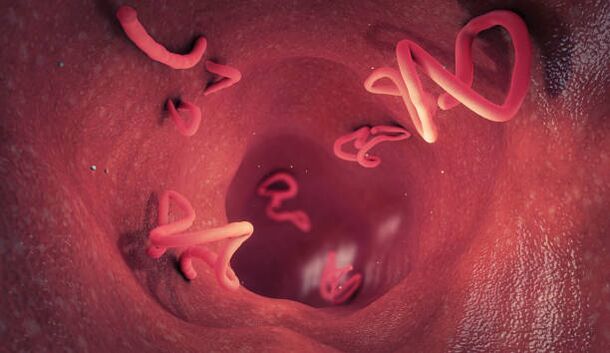Human parasitic diseases (from the Greek parasitos-"parasites") are a large group of diseases from the "Infectious Diseases" section, and their causes are unicellular and multicellular parasites.

A parasite is a living organism that lives or exists in the host, and obtains food from the host or at the cost of the host, that is, living a parasitic lifestyle. They all know how to survive in the human body, some are completely unknowingly, and some can cause serious damage to their health.
Pathogens of parasitic diseases
There are three main types of parasites that can cause human diseases:
Protozoa are microscopic single-celled organisms that can live or parasitize freely in nature. They are able to reproduce in humans, which helps their survival and also allows serious infections to develop from only one organism.
Worms (from Greek worms-"worms") are large multicellular organisms that are usually visible to the naked eye in adulthood. Like protozoa, worms can live freely or be parasitic. After adults, worms cannot reproduce in humans.
Ectoparasites: This term is usually used more narrowly to refer to organisms that adhere to or hide in the skin for a long period of time (weeks to months), such as ticks, fleas, and lice. Arthropods can cause infections on their own and can carry other diseases.
List of parasitic infections: amebiasis, ascariasis, hymenosis, bilobal filariasis, clonorchiasis, cryptosporidiosis, giardiasis, malaria (imported cases), beetle disease, Tapeworm disease, tapeworm disease, toxoplasmosis, toxoplasmosis, trichinosis, cysticercosis.
Signs of parasitic diseases.
Their manifestations are varied, depending on the type and location of the parasite, and the immune level of the host.
Protozoa most commonly cause diarrhea and other gastrointestinal symptoms. Worm infections can cause abdominal pain, diarrhea (diarrhea), muscle pain, coughing, skin damage, malnutrition, weight loss, impaired motor and language coordination, seizures, and many other symptoms, depending on the individual and the severity of the infection.
Diagnosis and treatment of parasitic diseases
The diagnosis of parasitic diseases includes:
- Clinical blood test.
- Blood tests for specific antibodies and parasite antigens.
- Blood smear.
- Analyze worms and parasite eggs in feces.
- Endoscopic research methods (for example, colonoscopy in the case of complex diagnosis).
- Radiography, magnetic resonance imaging (MRI), and computer tomography (CT) are used to detect serious damage to internal organs caused by parasites.
The treatment plan will depend on the specific diagnosis. Usually, the medicine is prescribed in the form of tablets, and sometimes requires hospitalization until surgical intervention.
Other treatments may also be recommended to relieve your symptoms (diet, drinking).
Prevent parasitic diseases
Prevention is always easier than cure, and there are some simple ways to protect yourself.
do not eat:
- Undercooked fish, crabs and shellfish;
- Uncooked meat;
- Unprocessed aquatic plants;
- Raw vegetables that may be contaminated with human or animal feces.
Parasites can live in natural water sources, so when swimming:
- Don't swallow
- Prevent the baby from defecation in the water, take the baby to the toilet every hour and check the diaper, change the diaper in the bathroom or diaper changing area instead of in the swimming pool, so as to prevent bacteria from entering the swimming pool;
- If your child has diarrhea, do not swim or let them swim;
- Do your little inspection (contamination);
- Shower for at least 1 minute before immersing in water.
Pets can carry parasites and spread them to humans. Zoonotic disease is a disease that spreads between animals and humans. Sometimes people infected with zoonotic diseases do not have any symptoms. Others may have symptoms such as diarrhea, muscle aches, and fever.
Regular veterinary care will protect your pet and your family. You can take some simple steps to protect yourself and your family from diseases that animals may carry. Make sure your pet is taken care of by a veterinarian.
Practice four rules:
- Collect animal feces quickly and dispose of them properly. Always wash your hands after disposing of household garbage.
- Wash your hands often, especially after touching animals, and avoid touching animal feces.
- Follow proper food handling procedures to reduce the risk of contamination from contaminated food.
- For people with weakened immune systems, take extra care when handling animals that can spread these infections.






































